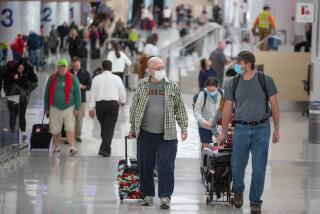Airports ‘Fly Blind’ With No Insurance
- Share via
Airports across the country are struggling to protect themselves financially after having their insurance coverage for war and acts of terrorism canceled in the wake of the Sept. 11 attacks.
Facing massive losses from the hijacking and crash of four jetliners and the attacks on the World Trade Center and the Pentagon, insurance companies quickly stopped such disaster coverage for airlines, airports and aviation service companies.
Six days after the attacks, Los Angeles International Airport was notified that its coverage was being discontinued in one week. John Wayne International in Orange County had its coverage policy stopped at about the same time.
Ever since, the world’s third busiest airport has gone without the coverage it previously had for up to $750 million in damage from acts of war or terrorism--provided as a rider to the airport’s basic insurance policy.
“Sept. 11 changed everything,” said airport spokesman Paul Haney. The only war risk or terrorism insurance the airport can buy today provides only $50 million worth of coverage at a very expensive price--$1.8 million for the next nine months.
“It isn’t a good deal,” Haney said. “We are assessing the situation and exploring what alternatives there may be, if any. Right now it doesn’t look too promising.”
The experience of LAX officials has not been unique, said Steve Van Beek, senior vice president of the Airports Council International-North America, a trade group representing all major commercial airports in the United States and Canada.
Besides cancellations, airports are being offered the $50-million cap on coverage and with significant exclusions for such critical airport functions as baggage handling and security screening, Van Beek said. Payouts could far exceed $50 million in the event of another successful terrorist attack, several industry officials said. “What is available now is unreasonable,” Van Beek said.
The financial bailout legislation for the airline industry included six months coverage for any terrorism-related losses greater than $100 million. Congress also agreed that federal taxpayers will reimburse airlines for higher insurance costs.
“They’ve protected the airlines,” Van Beek said, “not the airports.”
A few airports, such as San Francisco International and Chicago’s O’Hare International, have agreed to pay higher premiums for reduced coverage. But many others are “flying blind”--going without coverage--while seeking financial protection from Congress. A decision to operate without such insurance could leave airport authorities and local taxpayers at risk financially in the event of a terrorist attack, Van Beek said.
Kurt Forsgren, a director at Standard & Poor’s in San Francisco, said airports are operating under the assumption that, if something devastating should happen, they can apply to the Federal Emergency Management Agency or some other government agency for relief.
The absence of insurance coverage is one of the reasons the Wall Street rating agency has placed major airports on credit watch, which is often a prelude to lower bond ratings and higher borrowing costs.
Another Wall Street rating agency, Moody’s Investors Service, already has downgraded the debt of the private company that operates the international arrivals terminal at New York’s John F. Kennedy International Airport, in part because it has no insurance coverage.
Forsgren said the Canadian government has stepped in and provided some financial protection for airports. “U.S. airports have not received that kind of federal support and intervention,” he said.
Another segment of the aviation industry concerned about liability is the many companies that handle baggage and provide catering, fueling, cleaning and maintenance services to airlines. Those firms could receive insurance protection under the bailout measure already approved by Congress.
For the federal assistance extended to the airlines to apply also to airline-related businesses, U.S. Transportation Secretary Norman Y. Mineta must give his approval.
Representatives of such companies met with Mineta on Tuesday, asking for comparable coverage to what the airlines receive. “Otherwise, the sky’s the limit on our liability,” said Joe Czyzyk, chief executive of Mercury Air Group, a Los Angeles-based aviation service company.
More to Read
Inside the business of entertainment
The Wide Shot brings you news, analysis and insights on everything from streaming wars to production — and what it all means for the future.
You may occasionally receive promotional content from the Los Angeles Times.










